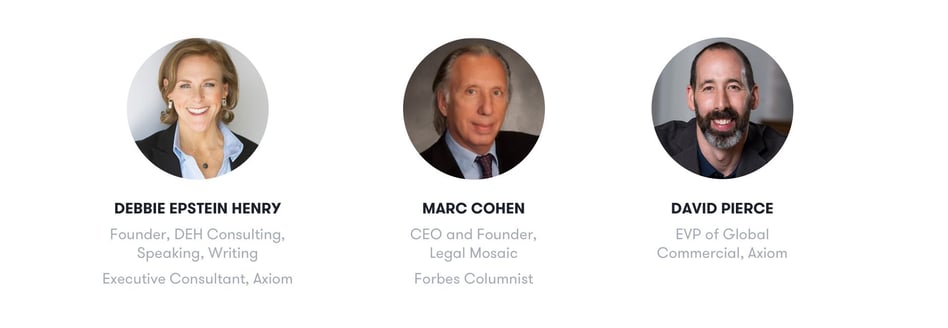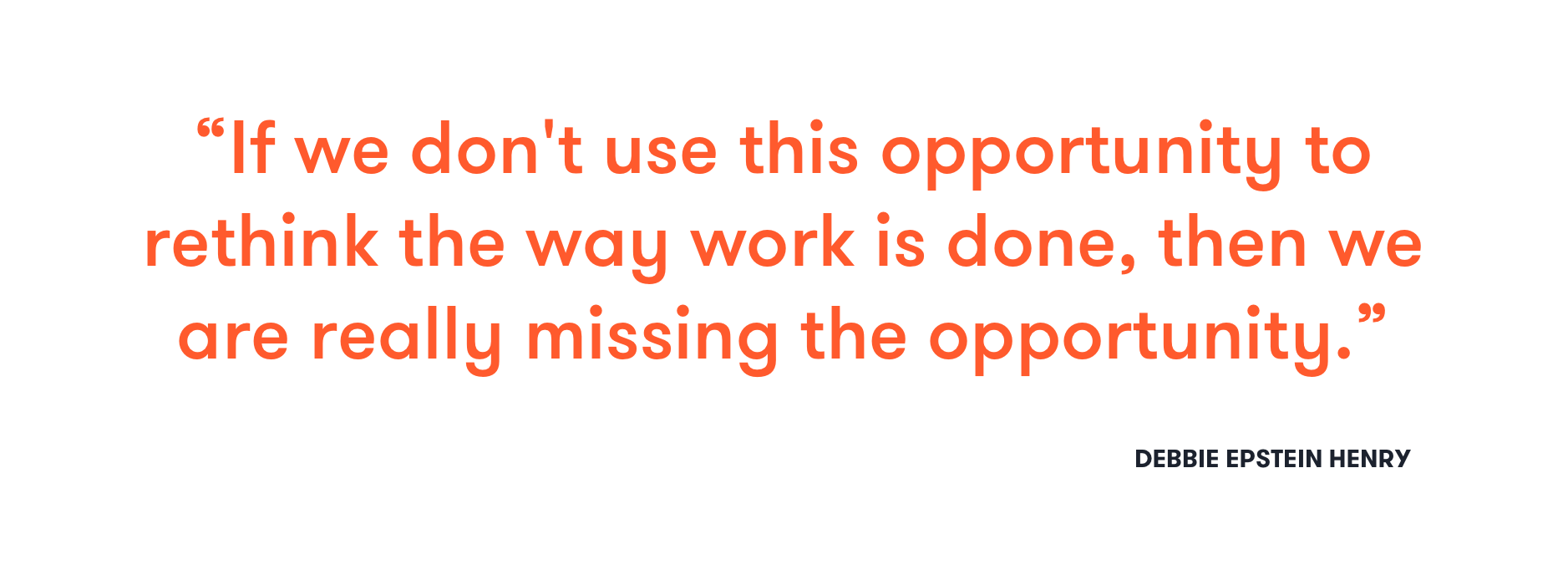Imperatives for a New Legal Industry Era
April 2020
By
Axiom Law

The changes brought on by the current economic crisis have rapidly shifted the way we work, our business outlook, and our daily lives. This is the first time a global health crisis has merged with a financial crisis of this magnitude, and the way forward is uncharted territory.
To help legal departments navigate and succeed in this new environment, Axiom co-hosted a webinar with Above the Law in late March 2020 to discuss the crisis’s impact on how the legal industry works, and the impact it will have on the industry long-term.
The webinar featured two speakers: Debbie Epstein Henry, founder of DEH Speaking, Consulting, Writing and Executive Consultant at Axiom; and Mark Cohen, founder of Legal Mosaic and a Forbes columnist. The discussion was moderated by David Pierce, EVP of Global Commercial at Axiom.
The discussion focused on how the legal industry must transform in order to survive the current downturn and thrive afterwards. In a recent column in Forbes, Mark Cohen called the impact of the coronavirus on the legal industry, and our culture as a whole, a “seismic event.” And Debbie Epstein Henry told participants, “If we don't use this opportunity to rethink the way work is done, then we are really missing the opportunity.”
 Below we highlight the key points from the discussion, including how the current moment is shifting ways of working in the legal industry. You can also watch a full replay on demand.
Below we highlight the key points from the discussion, including how the current moment is shifting ways of working in the legal industry. You can also watch a full replay on demand.
The legal industry is on the brink of transformation, and this crisis will accelerate it and force the legal industry to innovate and pivot away from outdated models
This moment must be acknowledged as an opportunity that necessitates a substantial shift in how the legal industry works. Debbie remarked, “It's up to us to change the way our industry functions and, in turn, how we service our clients.”
Mark pointed out that this crisis differs from past ones, specifically the downturn of 2008, saying, “It's not just an economic storm, but a very sudden, dramatic, and truly holistic change.” For the legal industry, Mark said, “This is not only going to accelerate change, it’s going to turbocharge it.”
Before the downturn brought on by COVID, the legal industry was already adapting and slowly changing: Law firms were under pressure to differentiate themselves, more legal work was being brought in-house, alternative legal service providers expanded the idea of how legal work could be unbundled, and technology was reshaping how work got done. However, as Mark pointed out, the changes brought on by these factors will “accelerate because the C-suite itself is going to be under such intense pressure to figure out how they are going to be able to reimagine the way they do things in this post COVID world.”

Ways of working and the skills lawyers will need to be successful will also shift. Mark foresees the following:
- The rise of an agile, flexible legal workforce
- Increased focus on how legal services will be delivered
- The need for lawyers to hone project management, data analytics, and risk assessment skills
He notes that this crisis “casts a very bright light on the fact that the traditional ways of delivering legal services are past their time.”
Debbie Epstein Henry agreed, noting, “Let's reframe this as opportunities in our industry to get smarter about how we deliver legal services on the one hand, and on the other hand, manage and develop our talent. There are so many inefficiencies in the way work is done in the legal profession, and the question is, can we see it as an opportunity instead of a loss?”
Remote work will push the legal industry to engage with the human element of work and transform how legal work is done
Debbie has been an advocate for non-linear careers and rethinking how legal work gets done for over 20 years. For her, this moment raises an important question when it comes to remote work, and she asks, “Can we capitalize on this moment where remote work is being required, and really see how to do this better?”
For remote work to be successful, Debbie notes that companies must:
- Craft deliberate remote work policies to ensure that quality of work is not negatively impacted
- Set parameters for what the workday looks like, and expectations for responsiveness to clients and colleagues, to provide a sense of certainty and support better performance
- Look closely at role functions and what jobs are required to work in certain ways, to strike the “magic mix” of remote and in-person connection
- Recognize the human element of who we are, and bring that into remote work situations without oversharing
- Be thoughtful about remote working guidelines to give employees the support they need, and enable them to customize based on individual work situations
Debbie looked at how this shift to a “remote mandate” can help change some fundamental issues in the legal industry. She stated, “This opportunity around remote work is a way for us to give people more flexibility and control in the way in which they work, and in turn use technology to facilitate better, most cost-effective answers, and use that to transform the legal industry.”
Legal leaders can use this moment to reevaluate their priorities and embrace a more dynamic, inclusive legal industry
“I think in order for people to be successful professionally, they actually have to be happy, ideally, or at least grounded personally,” Debbie pointed out. She outlined how this crisis necessitates action from legal leaders to integrate personal and professional lives, as well as reevaluate how legal teams work.
According to Debbie, legal leaders must “apply discipline” to rethink and ask themselves:
- Are we really listening to our clients and ensuring that we're delivering services to them in the best possible way?
- Are we really prioritizing our work and our allocation of time in a way that accurately reflects the import of the different projects and responsibilities we have?
- Are we communicating to our clients, colleagues, and community in the most productive way?
Debbie explained, “This assessment of our productivity, priorities, and relationships is something we should all be doing on a regular basis. But right now, we can take this opportunity to pause and make sure this collective experience that we are having informs the future of how we work and how we live. The bottom line is, we need to use this crisis to do better and to be better in the future.”
Mark agreed, emphasizing, “I think that the legal industry can do a much better job in terms of being more inclusive, in terms of who is in the industry, and kick down some of the absolutely anachronistic barriers to when, where, and under what circumstances people must work, and recognize that we are a service industry. You're not just servicing your firm, but most importantly, you are servicing your client or customer.”
Ultimately, legal leaders who are able to let go of “the ways we’ve always done it” and work with agility and thoughtfulness will equip themselves to embrace new opportunities and new models for the delivery of legal services. As a result, they will emerge from this moment empowered and ready for a transformed legal industry.
To hear more from Debbie Epstein Henry, Mark Cohen, and moderator David Pierce, watch the full webinar on demand.
Posted by
Axiom Law
Related Content
Setting 2021 Goals, with Booz Allen Hamilton CLO, Nancy J. Laben
Read legal leader Debbie Epstein Henry's takeaways from her December 2020 conversation with Nancy J. Laben, Executive Vice President and Chief Legal Officer, Booz Allen Hamilton.
COVID-19: People-Focused Guidance for Lawyers and Leaders
Axiom got into the remote working business before there really was one. For 20 years we’ve been learning, honing, and sharing the things that make remote workforces work well.
Maintaining a Resilient Legal Function During a Downturn
Sam Miller, former DGC of Intel, discusses leading through uncertainty and how legal leaders can make the most of their resources.
- Expertise
- North America
- Legal Department Management
- Must Read
- Perspectives
- Work and Career
- State of the Legal Industry
- Legal Technology
- Solutions
- Spotlight
- Artificial Intelligence
- Regulatory & Compliance
- Data Privacy & Cybersecurity
- United Kingdom
- General Counsel
- Legal Operations
- Australia
- Central Europe
- DGC Report
- Labor & Employment
- Banking
- Commercial & Contract Law
- Diversified Financial Services
- Hong Kong
- Intellectual Property
- Investment Banking
- Large Projects
- News
- Singapore
